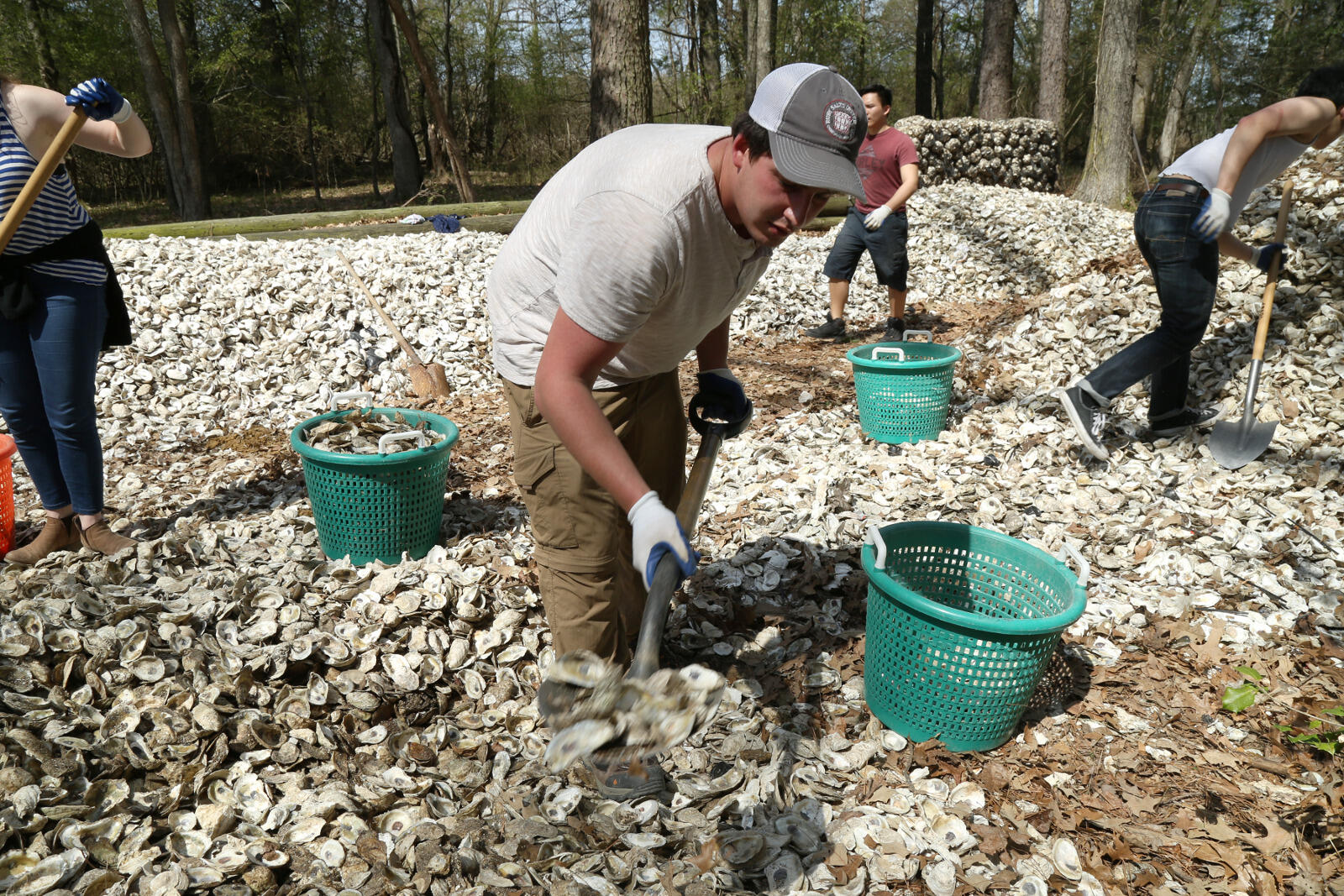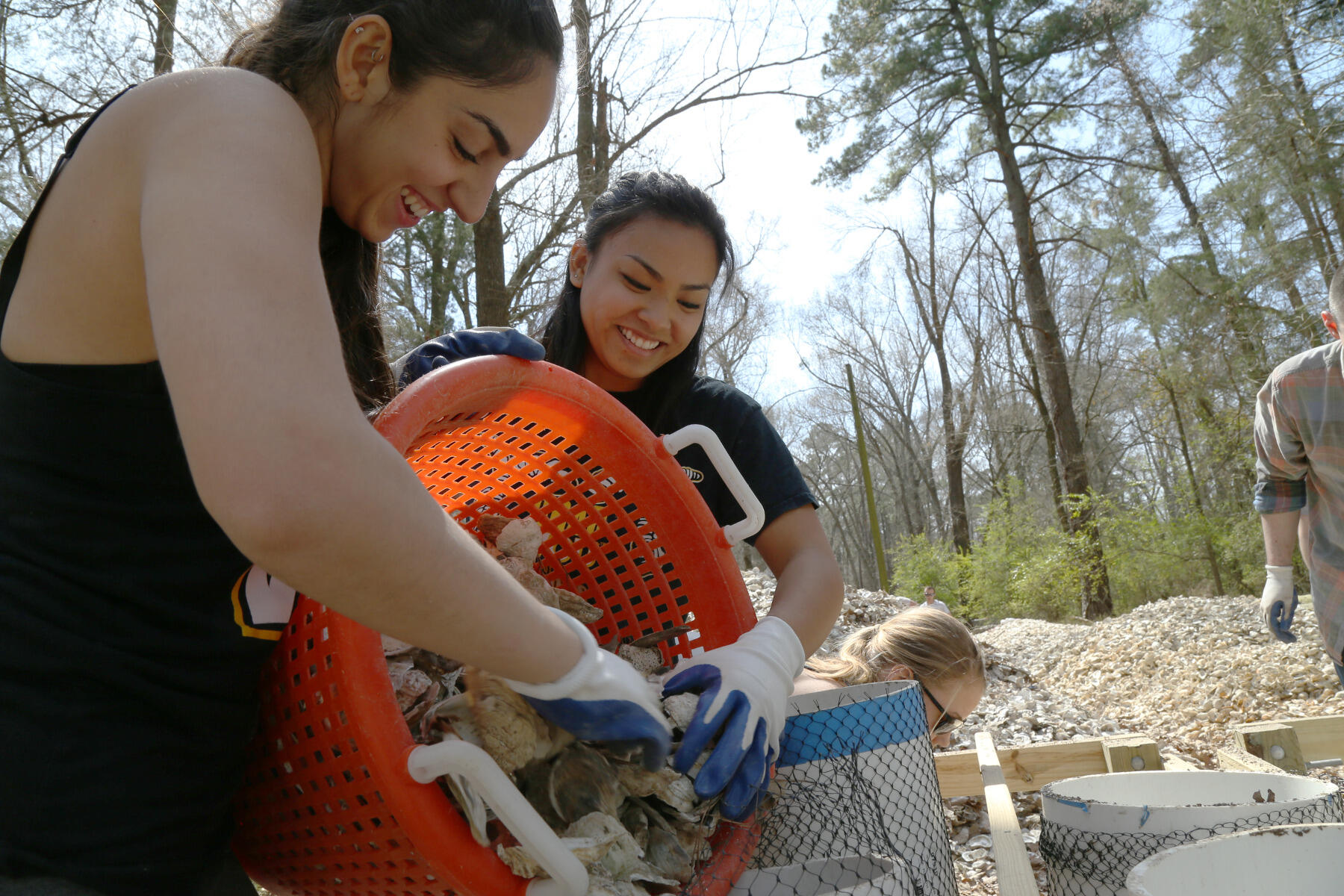
<br>Photos by Ronaldo Lopez, VCU Rice Rivers Center
June 13, 2017
VCU Rice Rivers Center and partners to dedicate a Virginia Treasures oyster reef
Share this story
State officials have added Ellery Kellum Rock, an oyster reef in Irvington, Virginia, to the Virginia Treasures list, thanks to a partnership between the Virginia Oyster Shell Recycling Program of the Virginia Commonwealth University Rice Rivers Center, the Friends of the Rappahannock and W.E. Kellum Seafood. Virginia’s Department of Conservation and Recreation leads the Virginia Treasures initiation to preserve, protect and highlight Virginia’s most important ecological, cultural, scenic and recreational assets.
A celebration of the partnership’s work to restore the reef will be held June 15, at the Tides Inn, located at 480 Carter Drive, Irvington, Virginia, from 5 – 6 p.m. Remarks will come from Molly Ward, state secretary of natural resources, and Gordon Slatford, general manager of The Tides Inn. After the remarks, attendees can board the 42-foot deadrise boat “The Faded Glory” to tour the reef and add shell — which makes up the reef’s substrate — to the creek bottom. The event is free and open to the public, and will include Virginia wine, beer from Port City Brewing Company and Ardent Craft Ales, and local oysters. Please RSVP on the Friends of the Rappahannock website.
The more oysters you have, the more you are helping to improve water quality and the larger ecosystem.
Ellery Kellum Rock is located in Carter’s Creek, a tributary of the lower Rappahannock River and is a historic oyster reef once called Carter’s Rock. The reef is part of a long-term effort to improve water quality in the creek and in the wider ecosystem of the Rappahannock, provide fish habitats and bolster wild oyster populations.
“Oysters actively filter up to 50 gallons of water per day. The more oysters you have, the more you are helping to improve water quality and the larger ecosystem,” said Todd Janeski, director of the Virginia Oyster Shell Recycling Program. “Recent data from VCU researchers have confirmed that more than 30 species of fish utilize oyster reefs during various life stages, so the local recreational fishing industry will also benefit.”
Ward praised the partnership for protecting Virginia’s waterways.
“In addition to protecting a vulnerable keystone species, Virginia’s oyster sanctuaries have a major positive impact on water quality,” Ward said. “The Ellery Kellum Rock Project is a great example of what can be accomplished when educators, industry and nonprofits work together to restore the Chesapeake Bay.”
Creation of Ellery Kellum Rock

The one-acre reef was created from oyster shells reclaimed by the Virginia Oyster Shell Recycling Program, W.E. Kellum Seafood and Friends of the Rappahannock River. VSORP collects waste oyster shells from restaurants across the state in order to return the shell to the Virginia portion of the Chesapeake Bay to create habitats for wild oysters, restoring these animal populations and improving water quality. The shells used on the reef were all locally generated and collected from the area. An oyster shell recycling bin installed by VSORP at the Lancaster County Transfer Station is the source of a portion of the material.
The lease for the river bottom that is now the site of Ellery Kellum Rock was held by the oyster harvesting company W.E. Kellum Seafood, and was deeded to the Friends of the Rappahannock River with the intent to keep the reef an unofficial sanctuary in perpetuity. No oysters will be harvested from Ellery Kellum Rock, but they will benefit local harvesters due to their reproduction enhancing local oyster populations. The Rice Rivers Center will work with Friends of the Rappahannock River to monitor the health of the reef and continue to add shell.
“This is the perfect opportunity for the dot-coms, the dot-orgs and the dot-edus to work together to restore the Rappahannock River and the productivity of Carter’s Creek,” said Richard Moncure, tidal river steward of Friends of the Rappahannock.
Ellery Kellum Rock was named for the late W. Ellery Kellum, who opened W.E. Kellum Seafood in Weems, Virginia, in 1948.
“This is about the ability of our company to give something back based on the fortune we have had because of this valuable natural resource,” said Tommy Kellum, W. Ellery Kellum’s great-grandson and vice president of W.E. Kellum Seafood.

In order to educate the public about the reef’s importance to ecology and industry, Virginia Watermen’s Heritage Tours and the Hope and Glory Inn will include information about the reef in educational tours of area waterways. The Tides Inn will also conduct educational activities with guests, and pledges to return all shells from oysters shucked at its restaurant to Ellery Kellum Rock and surrounding oyster reefs.
Subscribe to VCU News
Subscribe to VCU News at newsletter.vcu.edu and receive a selection of stories, videos, photos, news clips and event listings in your inbox.









